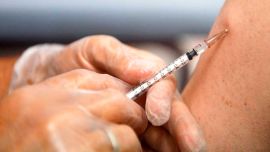Participation in Argentina’s US$21.7 billion debt swap on Thursday may have been less than reported, with government officials and analysts disagreeing on how the results of the swap should be counted.
Local analysts are insisting that the participation rate was closer to 58 percent, rather than the 64 percent reported by the government Thursday evening, because the Economy Ministry included securities in the swap that were already included in a debt exchange in January.
“At first glance, the result is not very encouraging,” Pedro Siaba Serrate, head of research and strategy at Portfolio Personal Inversiones in Buenos Aires wrote in a report. “The Economy Ministry had announced an acceptance of 64 percent, but that number also included the previous exchange in January.”
The securities maturing in March were included because the exchange was a reopening of an earlier swap in January, according to an Economy Ministry official with direct knowledge of the matter, who isn’t authorised to speak publicly on the transaction. The official said that including the March figures, the participation rate was 62 percent.
The government will meet with mutual funds on Monday and Tuesday as it looks to roll over securities that it failed to exchange in the latest swap. An auction is expected to follow on March 22, according to the official.
Worse than expected
The parallel exchange rate, known locally as the blue-chip swap, slipped 0.6 percent on Friday to a record low. The rate, derived from buying securities locally and selling them abroad, has weakened as much as 4.9 percent in the past week to nearly 392 pesos per dollar.
The debt swap is weighing on the market.
“The result was below the thresholds we previously estimated,” Adrian Yarde Buller, chief economist at Facimex Valores in Buenos Aires, wrote in a report. Participation was “far from expectations and doesn’t clear Argentina’s horizon of maturities.”
As such, the exchange is doing little to dispel fears that Argentina may be forced to reprofile its local debt ahead of presidential elections in October. The country faces maturities for 600 billion pesos in March and around one trillion pesos per month between April and June.
Argentina is already facing a deeper recession than previously expected this year as one of the worst droughts in recent memory ravages crucial farm exports. Itaú Unibanco Holding SA widened its forecast for an economic contraction this year to three percent from 1.5 percent on Wednesday on the drought.
“Dollar availability is going to be quite low because of the drought,” said Ramiro Blazquez, head of research at BancTrust & Co in Buenos Aires. “The results of the swap reinforce our view that it’s going to be much more challenging for the government to avoid some kind of FX correction ahead of the elections.”
related news
by Scott Squires & Ignacio Olivera Doll, Bloomberg
























Comments